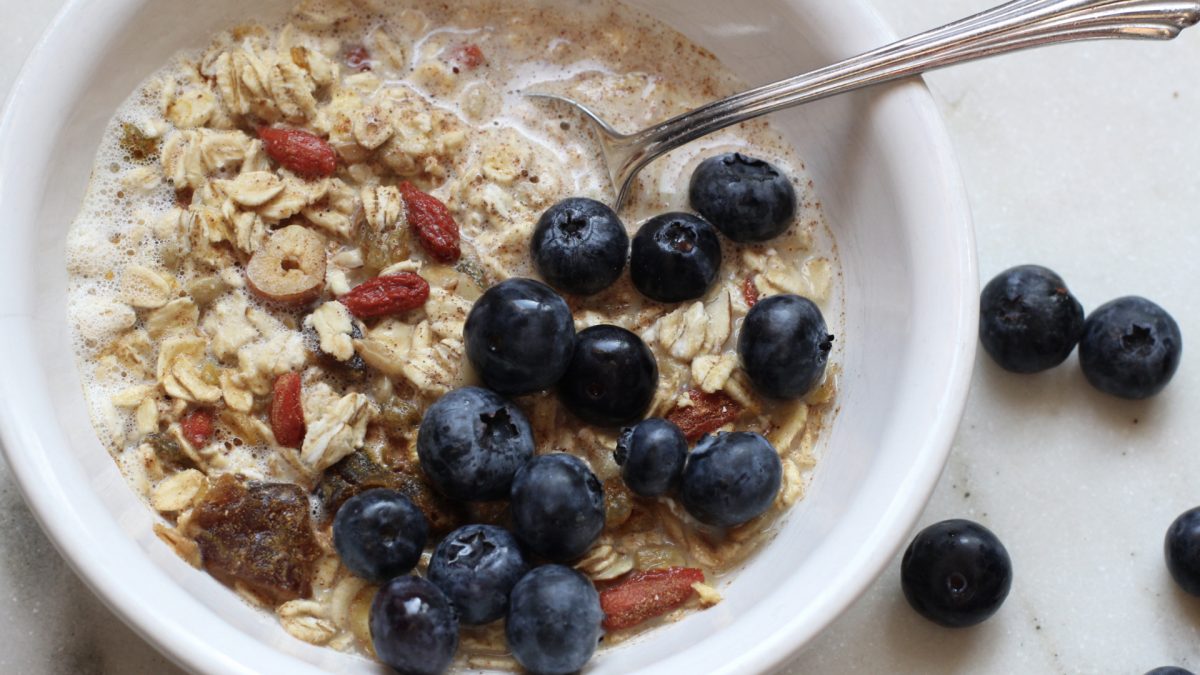Yes. A 2015 analysis found that people who eat more whole grains, which includes oats, tend to live significantly longer lives independent of other measured dietary and lifestyle factors.
What Are The Types Of Oatmeal?
- Instant oats
- Rolled oats
- Steel-cut oats
- Scottish oats
- Oat groats
What Is the Difference Between Rolled Oats and Steel-Cut Oats?
As I discuss in my video Which Is a Better Breakfast: Cereal or Oatmeal?, the physical form of food alters carbohydrate absorption. Rolled oats, for example, have a significantly lower glycemic index than instant oatmeal, which is just oats, but in thinner flakes, and oat flakes cause lower blood sugar and insulin spikes than powdered oats. Indeed, the same single ingredient–oats, in this case–can have different effects in its different forms.
Why do we care? Well, the overly rapid absorption of carbohydrates after eating a high-glycemic index meal can trigger a sequence of hormonal and metabolic changes that may promote excessive eating. Researchers fed a dozen obese teen boys different meals, each with the same number of calories, and followed them for the next five hours to measure their subsequent food intake. Those who ate the instant oatmeal went on to eat 53 percent more than the boys who ate the same number of calories of steel-cut oatmeal. The instant oatmeal group was snacking within an hour after the meal and went on to consume significantly more calories throughout the rest of the day. Same food but different forms had different effects.
It’s crazy how the same product can have such different effects on the body, based on how it’s processed. Beyond focusing just on whole rather than refined grains, the wholiest of all are intact grains. Instant oats are better than powdered oats, rolled oats are better than instant, steel-cut oats are better than rolled, and intact oat groats are the best of all!
Why Is Oatmeal Good For You?
Here are some oatmeal’s proven health benefits.
Aids Weight Control
Oatmeal helps to keep you fuller for longer. Researchers randomized individuals into three different breakfast groups: oatmeal made from quick oats, the same number of calories of Frosted Flakes, or just plain water. They then measured how much people ate for lunch three hours later. Not only did those who ate the oatmeal feel significantly fuller and less hungry, but they then went on to eat significantly less lunch. Overweight participants ate less than half as many calories at lunch after eating the oatmeal for breakfast—hundreds and hundreds of fewer calories. In fact, the breakfast cereal was so unsatiating that the corn flakes group ate as much as the breakfast-skipping, water-only group. The soluble fiber in oatmeal forms a gel in the stomach, which delays stomach emptying and makes one feel full for a longer period, helping with weight loss.
Lowers Cholesterol
The fiber in oatmeal can lower our blood cholesterol levels so less gets stuck in our arteries. There are also anti-inflammatory and antioxidant phytonutrients in oats that can help prevent atherosclerotic buildup and then help maintain arterial function. Check out my video Can Oatmeal Reverse Heart Disease? for more on this.
Improves Liver Function
In a double-blinded randomized trial of overweight and obese men and women, almost 90% of the real oatmeal-treated subjects had reduced body weight–compared to no weight loss in the control group–a slimmer waist on average, a 20-point drop in cholesterol, and an improvement in liver function. More on this in my video Can Oatmeal Help Fatty Liver Disease?
Our Black Bean Burger and Basic BROL recipes feature oats, so check them out!
To learn more about oats, visit our topic page, which covers a broad range of the latest evidence-based research.
